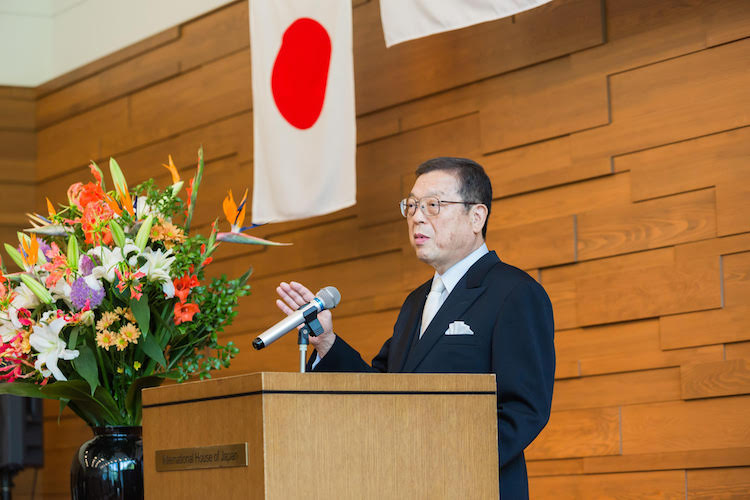Viewpoint by Fumiyasu Akegawa
Fumiyasu Akegawa is founder and president of DEVNET Japan.
TOKYO (IDN) – Since DEVNET Japan participated in August 2015 in Expo 2015 hosted by the Italian city of Milan, the organization set up in March 2013 to promote Sustainable Development Goals (SDGs) particularly in Southeast Asia has made considerable strides.
It was one of the notable non-official participants of the universal exhibition. Then known as DEVNET Tokyo Foundation, we availed of Milan Expo 2015 to throw light on our agenda focused on promoting seven themes: poverty alleviation; food security; humanitarian support; environmental protection; advanced technology and energy saving; support of women entrepreneurs and improvement of women’s status; and the establishment of sustainable developing society.
In doing so, we had in mind the Human Development Report: “Understanding the links between environmental sustainability and equity is critical if we are to expand human freedoms for current and future generations.”
With this view, over the past more than two years, we have been promoting agriculture and commerce in Southeast Asia, particularly in Thailand and Vietnam. Our task has been facilitated by the proximity of the two countries’ religious beliefs and partly culture to those of Japan.
Our 14 visits to Thailand and Vietnam during the past two years have enabled us to establish good relations with the Thai King’s aides, the Deputy Prime Minister of Vietnam, the President of the Vietnam Women Entrepreneurs’ Council, and the Vietnam Chamber of Commerce and Industry (VCCI).
Back home, we are connected to the Japan International Cooperation Agency (JICA) as well as many major corporate executives of diverse industries.
We are currently undertaking development projects in an area of 6,000 hectares in the vicinity of Ho Chi Minh in Vietnam, and plan to set up small businesses in Hanoi and Bangkok. We are drawing a big city plan that aims at developing an infrastructure conducive to agriculture as the cornerstone of modernization, such as agriculture and forestry, fishery and livestock processing, residential facilities, educational institutions, medical institutions, nursing care facilities, beauty care facilities, distribution centers, and shopping centers.
An important prerequisite of implementing these plans is to develop human resources including those who can serve as executives. In order to train persons to be executives, it is best to utilize a “foreign technical trainee system” – a system that offers persons of developing countries training facilities in Japan for three to five years, with the aim of transferring technologies to developing countries.
We are drafting a plan that would avail of the system for the development of human resources in Ho Chi Minh, and employment in businesses in Hanoi and Bangkok through their acquired technical skills in Japan, and business support for them. In order for this project to be successful, three requirements should be fulfilled: Japanese companies accepting intern trainees, delivery agencies in Vietnam to send them to Japan, and supervising organizations that would oversee both aspects.
Since DEVNET Japan took upon itself to supervise all activities, it has been casting a close look at each stage of implementation of the project. It interviewed ‘trainees’, collected information through the Immigration Bureau, the Ministry of Health, Labor and Welfare and the Ministry of Foreign Affairs.
On the basis of the information collected and repeated petitions to the Japanese government, we launched in November 2017 a new system for providing technical training to intern trainees. This is a significant improvement on the former system. An ‘Organization for Technical Intern Training (OTIT)’ has been established and professionals tasked with training.
Subsequently, even though the sending agencies in Vietnam are beyond the reach of law in Japan, and extract considerable amounts of money from technical trainees and arouse false expectations of obtaining plush jobs in Japan, will be wound up out by a bilateral agreement between Japan and Vietnam.
Furthermore, we will also file lawsuits against agencies forcing them return the money which they extracted from technical trainees who already arrived and were working in Japan. We cannot forgive the wicked agencies that make money illegally from young people coming to Japan dream of a paradise in the future.
However, there is another impediment on road to decent jobs: there are very few workplaces in their home country so that they cannot demonstrate their acquired skills. This is not the case only with technical trainees, but also with skilled workers, international students and other professionals such as engineers who are being trained in Japan.
We are drafting plans to remedy this unfortunate situation.
Fortunately, our group corporation has a cooperative association of a supervising organization that receives technical trainees as a free placement project, and a company, approved as of November 1, 2017 that admits highly specialized persons and international students as part of a paid employment placement project. So, together with sending agencies in Vietnam, Thailand, Cambodia, and Myanmar among others, we will establish opportunities for development of human resources, enabling competent persons acquire necessary skills and supporting them to be hired in a managerial post after returning home.
Our group corporation already accepted 100 foreign technical trainees and sent them to receiving companies in Japan after one month of training courses. We are planning to receive more than 300 new trainees in 2018. We are also drafting a plan for establishing 10,000 joint venture companies with workplaces in their home countries, and thus offering opportunities for a prosperous future.
We are setting up a fund with the support of JICA, JBIC (Japan Bank for International Cooperation), Vietnam Chamber of Commerce and Industry, and other financial institutions to benefit generations to come in Ho Chi Minh City, Hanoi and Bangkok. [IDN-InDepthNews – 27 December 2017]
This article is part of IDN’s media project jointly with Global Cooperation Council and DEVNET Japan.
Photo: Fumiyasu Akegawa addressing an audience during one of his visits to Thailand and Vietnam. Credit: DEVNET Japan
IDN is flagship agency of the International Press Syndicate.
facebook.com/IDN.GoingDeeper – twitter.com/InDepthNews

